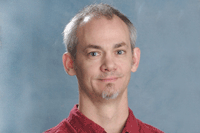Lead Scientist
Cell Reprogramming Platform
Bill Stanford
Senior Scientist, Regenerative Medicine Program,
Ottawa Hospital Research Institute
Dr. Stanford received his Bachelor’s degree in Chemistry from Duke University and his Doctorate in Immunology from the University of North Carolina at Chapel Hill. Dr. Stanford came to Canada as a Postdoctoral Fellow in Dr. Alan Bernstein’s laboratory in the Samuel Lunenfeld Research Institute (SLRI) at Mt. Sinai Hospital.
He established his laboratory at the University of Toronto in January 2002, where he is a Full Professor and Canada Research Chair in Stem Cell Bioengineering and Functional Genomics. Dr. Stanford is the Director of Gene Trap Mutagenesis in the Centre for Modeling Human Disease (CMHD) at the SLRI and is the Co-Scientific Director of the Ontario Human Induced Pluripotent Stem Cell Facility. He is also a Member of the Heart & Stroke/Richard Lewar Centre of Excellence at the University of Toronto and a Scientist in the Regenerative Medicine Program at the McLaughlin Centre for Molecular Medicine, University of Toronto.
Dr. Stanford’s laboratory is focused on basic and applied research in stem cell biology, tissue engineering and modeling human disease using mouse mutagenesis and patient-specific induced pluripotent stem (iPS) cells. He has received several notable distinctions for his work, including the Premier’s Research Excellence Award and the Top Research Award from the Institute of Musculoskeletal Health and Arthritis Quality of Life. Dr. Stanford has published over 60 manuscripts in high-ranking journals that include: Cell Stem Cell, Nature Protocols and Nature Genetics, earning almost 3000 citations and an h-index of 24. He is a valued member of several professional organizations and is a founding member of the Canadian Mouse Consortium, the International Gene Trap Consortium as well as the International Mouse Mutant Consortium. Dr. Stanford’s opinion is highly sought-after as a reviewer for journals such as Cell, Development and Nature Biotechnology, as well as on numerous research grants panels and as a consultant for industry. He has generated 9 inventions/patents from his research.
The Stanford Laboratory has been an excellent source of high-level multidisciplinary training for a large number of trainees, including over 30 undergraduates, 15 graduate students and 12 postdoctoral fellows, many of who have gone on to independent scientific careers. Dr. Stanford is also involved with science outreach activities, including Let’s Talk Science, has served on numerous examination/advisory committees and has a strong history of teaching both graduate- and undergraduate-level courses.
Return to Lead Scientists & Translation Advisory Group


